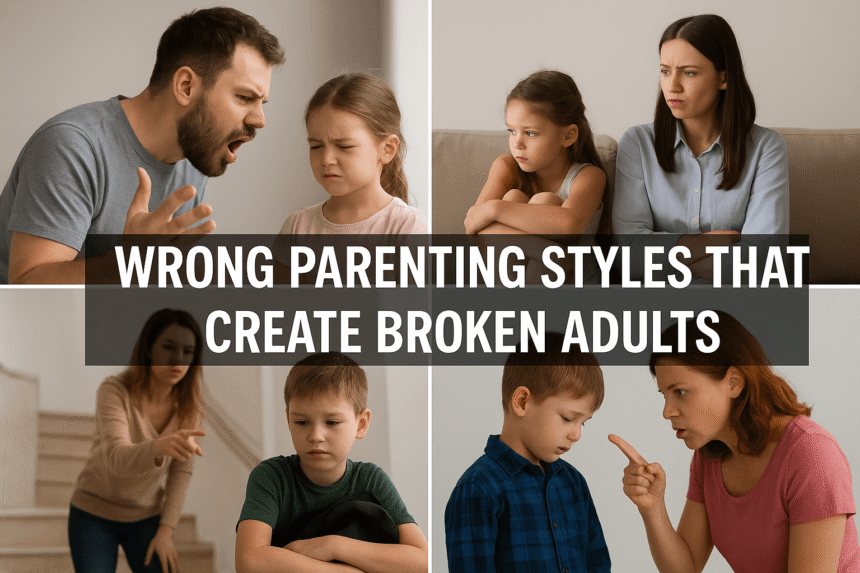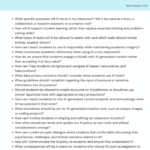Wrong parenting styles can silently shape a child’s emotional world, often leading to brokenness that lasts into adulthood. Parenting is one of life’s greatest responsibilities, yet many parents unintentionally raise children with deep emotional wounds. Marriage may be beautiful, but parenting demands more than providing food and shelter—it requires emotional intelligence, empathy, and consistency. Unfortunately, adults wounded in childhood often become parents who repeat the same patterns with their kids. In this blog, we will explore 10 wrong parenting styles that unknowingly create broken adults, why they are harmful, and how to break this cycle for the next generation.
What Are the Wrong Parenting Styles?
Wrong parenting styles are patterns of behaviour and communication that harm a child’s emotional or psychological development. They are not always intentional. Many parents believe they are doing their best, but certain actions—such as constant shouting, comparison, or neglect—can have lasting negative effects. These styles affect a child’s confidence, self-worth, and ability to form healthy relationships. For example, a child constantly criticised for small mistakes may grow into an adult who fears failure and avoids taking risks. Understanding these wrong approaches helps parents reflect, correct, and choose healthier methods of nurturing.
Why Wrong Parenting Styles Create Broken Adults
Every word, action, or reaction from a parent becomes part of a child’s identity. Wrong parenting styles create broken adults because they plant seeds of fear, shame, and insecurity in young hearts. A child who grows up feeling unloved, compared, or constantly punished may struggle with self-esteem and emotional regulation later in life. When these wounds go unhealed, they show up in adulthood as anxiety, poor relationships, or an inability to express love. The goal is not to be perfect parents, but to be present, patient, and purposeful in how we raise our children. Awareness is the first step to healing and transformation.
10 Wrong Parenting Styles

1. The Shouting and Beating Style
Some parents believe shouting or hitting is the only way to discipline. However, children who are constantly yelled at or physically abused often grow up fearing authority and doubting their worth. For instance, a child scolded harshly for breaking a cup may internalise the belief that mistakes make them unworthy of love. Over time, they become emotionally crippled adults who struggle with anxiety or aggression. Instead of shouting, parents can use calm communication—kneel, make eye contact, and explain the mistake clearly and gently. Discipline should correct behaviour, not crush self-esteem. A firm tone and consistent boundaries work far better than fear-based parenting.
Physical Punishment Of Children Is Not Good For Children’s Development
2. The Over-Pampering Style
Over-pampering looks like love, but it can destroy responsibility. Parents who never say “no” raise children who cannot handle disappointment or responsibility. For example, a boy who gets everything he demands may grow into a man who expects his spouse or colleagues to cater to him. Over-pampered children often struggle with discipline and gratitude. The best approach is balanced love—teach children empathy, accountability, and the value of effort. Encourage them to earn rewards rather than receive them easily. A loving “no” can be more beneficial than a careless “yes.”
3. The Too-Busy Parenting Style
Modern life makes many parents too busy chasing success, often at the expense of family connection. When children are raised by gadgets or house help, they may feel emotionally abandoned. They know their parents pay school fees, but may never feel truly loved. For instance, a child who longs for bedtime stories but gets only screen time may grow into an adult who struggles with intimacy. Tip: Schedule daily “family moments” free from phones or distractions. Even 20 minutes of focused attention builds emotional security. Children spell love as “T-I-M-E.”
4. The Comparison Style
Comparison kills confidence. Statements like “See your sister, she’s better than you” damage a child’s self-worth. Constant comparison creates jealousy, resentment, and insecurity. These children grow into adults who compete for validation rather than connect from confidence. For example, a boy compared to his cousin may grow up resenting both his parents and his peers. Instead of comparing, celebrate each child’s uniqueness. Encourage their strengths and help them improve their weaknesses with guidance, not judgment. Remember, every child blooms differently—roses and lilies are both beautiful in their own way.
5. The Military Parenting Style
In this style, parents rule with rigidity—no smiles, no hugs, only commands. Children raised under such strictness learn obedience but not emotional warmth. They may become adults who fear vulnerability or struggle to express affection. For instance, a girl raised by an overly strict father might later find it hard to trust love from her partner. Discipline should have a heart. Parents should combine structure with affection. Praise your child’s effort, not just results. A gentle word of encouragement can achieve what hundreds of orders cannot.
6. The Public Shaming Style
Humiliating a child in public may seem like a quick correction, but it causes long-term damage. A parent calling their child “useless” in front of others breaks their spirit. Such children grow up doubting their worth and often overcompensate by trying too hard to please people. For instance, a child scolded at school in front of friends might stop participating altogether. Parents should correct privately and praise publicly. Protect your child’s dignity, even when they are wrong. A safe home builds confidence that lasts a lifetime.
7. The Neglect Style
Neglect isn’t always physical—it can be emotional. Parents who never notice their child’s sadness or never ask, “How was your day?” leave deep emotional scars. A child who feels unseen grows into an adult who constantly seeks attention, often from unhealthy sources. For example, many young adults enter toxic relationships because they crave the affection they missed at home. To avoid this, parents must practice emotional presence—listen, empathise, and show genuine interest. Quality attention communicates love better than any material gift.
8. The Hypocritical Style
Children are excellent observers. When parents preach honesty but lie, or act loving in public but fight at home, kids learn confusion. Hypocrisy in parenting creates distrust and resentment. Such children often grow up hating religion or authority. For example, a child whose parents fight daily after church may associate faith with conflict. The best way to raise authentic children is by being authentic parents. Live the values you teach. Consistency between words and actions builds integrity in your child’s heart. Are you a Hypocritical Parent?
9. The Over-Control Style
Over-controlling parents make every decision for their children—from the subjects they study to the people they marry. This suffocates individuality and independence. Such children either rebel or become indecisive adults. For example, a son forced into a career he doesn’t enjoy might resent his parents and live in quiet frustration. Instead, guide without dominating. Offer advice but allow freedom to choose. Mistakes are part of learning. When children make small decisions early, they develop the confidence to make big ones later in life.
10. The Conditional Love Style
Conditional love teaches children that they are valued only when they perform well. “I love you because you scored A’s” sends a harmful message—love must be earned. Such children become adults who constantly seek validation and fear failure. They may even struggle in marriage, believing they must be perfect to be loved. The right way is to show unconditional love—affirm your child even when they fail. Correct behaviour, but never withdraw affection. Let them know, “I may not like what you did, but I still love you.” That assurance builds emotional resilience.
Conclusion
Dear parents, children do not just grow—they are shaped. Many adults today are still healing from the consequences of wrong parenting styles. But it is never too late to break the cycle. Let us raise children who are emotionally whole, spiritually grounded, and mentally strong. Correct with love, discipline with wisdom, and listen with empathy. Parenting is not about perfection—it is about connection. Remember, a healthy child today becomes a healthy spouse and parent tomorrow. Let us commit to raising a generation that is not broken but beautifully whole.
FAQs on Wrong Parenting Styles
1. What are the wrong parenting styles?
Wrong parenting styles are harmful ways of raising children that negatively affect their emotional, mental, or social development. Examples include shouting, over-controlling, and neglecting emotional needs.
2. Why do some parents follow wrong parenting styles?
Often, parents repeat what they experienced in their own childhood. Others may lack awareness or believe harsh discipline is the only way to build strong children.
3. How can parents correct their wrong parenting habits?
Start with self-awareness. Apologise when necessary, seek parenting education, and focus on emotional connection. Replace shouting with calm communication and spend quality time with your child.
4. What are the signs of a broken adult?
Broken adults often struggle with low self-esteem, anxiety, or emotional detachment. They may find it hard to trust, love, or make confident decisions due to childhood wounds.
5. Can children recover from wrong parenting?
Yes, healing is possible through love, therapy, self-awareness, and healthy relationships. Parents can also begin anew by breaking toxic patterns and nurturing with understanding.
Thank you for taking the time to explore this post. I hope you found it both insightful and enjoyable.
Remember, your sharing can make a positive impact! Please share this post across your social media and other networks, allowing others to gain from its content.
PVM
Read The 3 Most Problematic Parenting Styles

Mathukutty P. V. is the founder of Simply Life Tips, a blogger, content writer, influencer, and YouTuber passionate about learning and sharing. Guided by “Simple Living, Creative Thinking,” he believes in the power of knowledge sharing and lifelong learning.







